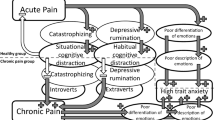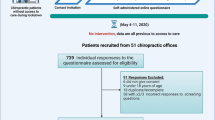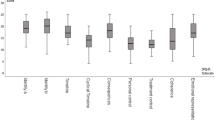Abstract
Arthritis pain has traditionally been evaluated from a biomedical perspective, but there is increasing evidence that psychological factors have an important role in patients' adjustment to arthritis pain. The evolution of pain theories has led to the development of models, such as the cognitive–behavioral model, which recognize the potential involvement of psychological factors in pain. Emotional, cognitive, behavioral and social context variables are useful in understanding pain in patients with arthritis, and have led to the development of psychological approaches for treating arthritis pain. These include pain coping skills training, interventions that include patients' partners, and emotional disclosure strategies.
Key Points
-
Theoretical perspectives on pain emphasize the critical role of psychological variables for understanding and treating arthritis pain and pain-related disability
-
Psychological factors, including emotions, cognitions, and social context variables, are useful in understanding arthritis pain
-
Psychological interventions, such as pain coping skills training, are useful for decreasing arthritis pain, psychological distress, and arthritis-related disability
-
Continuing efforts are needed to heighten rheumatologists' awareness of the psychological aspects of pain management
This is a preview of subscription content, access via your institution
Access options
Subscribe to this journal
Receive 12 print issues and online access
$209.00 per year
only $17.42 per issue
Buy this article
- Purchase on Springer Link
- Instant access to full article PDF
Prices may be subject to local taxes which are calculated during checkout

Similar content being viewed by others
References
Melzack, R. & Wall, P. D. Pain mechanisms: a new theory. Science 150, 971–979 (1965).
Melzack, R. Pain and the neuromatrix in the brain. J. Dent. Educ. 65, 1378–1382 (2001).
Turk, D., Meichenbaum, D. H. & Genest, M. Pain and Behavioral Medicine: A Cognitive-Behavioral Perspective (Guilford Press, New York, 1983).
Manne, S. L. & Zautra, A. J. Couples coping with chronic illness: women with rheumatoid arthritis and their healthy husbands. J. Behav. Med. 13, 327–342 (1990).
Beaupre, P. et al. A computer-assisted observational method for assessing spouses' judgments of osteoarthritis patients' pain. Psychol. Health Med. 2, 99–108 (1997).
Radojevic, V., Nicassio, P. M. & Weisman, M. H. Behavioral intervention with and without family support for rheumatoid arthritis. Behav. Ther. 23, 13–30 (1992).
Cano, A., Johansen, A. B. & Franz, A. Multilevel analysis of couple congruence on pain, interference, and disability. Pain 118, 369–379 (2005).
Major, B., Zubek, J. M., Cooper, M. L., Cozzarelli, C. & Richards, C. Mixed messages: implications of social conflict and social support within close relationships for adjustment to a stressful life event. J. Pers. Soc. Psychol. 72, 1349–1363 (1997).
Creamins-Smith, J. K. et al. Spouses' and physicians' perceptions of pain severity in older women with osteoarthritis: dyadic agreement and patients' well being. Pain 106, 27–34 (2003).
Block, A. R., Kremer, E. F. & Gaylor, M. Behavioral treatment of chronic pain: the spouse as a discriminative cue for pain behavior. Pain 9, 243–252 (1980).
Flor, H., Turk, D. C. & Rudy, T. E. Relationship of pain impact and significant other reinforcement of pain behaviors: the mediating role of gender, marital status, and marital satisfaction. Pain 38, 45–50 (1989).
Turk, D. C., Kerns, R. D. & Rosenberg, R. Effects of marital interaction on chronic pain and disability: examining the down side of social support. Rehabil. Psychol. 37, 259–274 (1992).
Martire, L. M. et al. Older spouses' perceptions of partners' chronic arthritis pain: Implications for spousal responses, support provision, and caregiver experiences. Psychol. Aging 21, 222–230 (2005).
Reich, J. W., Olmsted, M. E. & van Puymbroeck, C. M. Illness uncertainty, partner caregiver burden and support, and relationship satisfaction in fibromyalgia and osteoarthritis patients. Arthritis Rheum. 55, 86–93 (2006).
Druley, J. A., Stephens, M. A. P., Martire, L. M., Ennis, N. & Wojno, W. C. Emotional congruence in older couples coping with wive's osteoarthritis: exacerbating effects on pain behavior. Psychol. Aging 18, 406–414 (2003).
Keefe, F. J. et al. Spouse-assisted coping skills training in the management of osteoarthritis knee pain. Arthritis Care Res. 9, 279–291 (1996).
Keefe, F. J. et al. Spouse-assisted coping skills training in the management of knee pain in osteoarthritis: Long-term follow up results. Arthritis Care Res. 12, 101–111 (1999).
Epstein, N. B. & Baucom, D. H. Enhanced Cognitive–Behavioral Therapy for Couples: A Contextual Approach (American Psychological Association, Washington, D. C., 2002).
Baucom, D. H., Shoham, V., Mueser, K. T., Daiuto, A. D. & Stickle, T. R. Empirically supported couple and family interventions for marital distress and adult mental health problems. J. Consult. Clin. Psychol. 66, 53–88 (1998).
Hadjistavropoulos, T. & Craig, K. D. A theoretical framework for understanding self-report and observational measures of pain: a communications model. Behav. Res. Ther. 50, 551–570 (2002).
Hadjistavropoulos, T., Craig, K. D. & Fuchs-Lacelle, S. K. in Pain: Psychological Perspectives (eds Hadjistavropoulos, T. & Craig, K. D.) 87–112 (Lawrence Erlbaum Associates, Mahwah, 2004).
Melzack, R. From the gate to the neuromatrix. Pain S6, S121–S126 (1999).
Keefe, F. J., Abernethy, A. P. & Campbell, L. C. Psychological approaches to understanding and treating disease-related pain. Annu. Rev. Psychol. 56, 601–630 (2005).
Chapman, C. R., Tuckett, R. P. & Song, C. W. Pain and stress in a systems perspective: reciprocal neural, endocrine, and immune interactions. J. Pain 9, 122–145 (2008).
Lundberg, U. et al. Psychophysiological stress responses, muscle tension, and neck and shoulder pain among supermarket cashiers. J. Occup. Health Psychol. 4, 245–255 (1999).
Covic, T., Tyson, G., Spencer, D. & Howe, G. Depression in rheumatoid arthritis patients: demographic, clinical, and psychological predictors. J. Psychosom. Res. 60, 469–476 (2006).
Wolfe, F. & Michaud, K. Predicting depression in rheumatoid arthritis: the signal importance of pain extent and fatigue, and comorbidity. Arthritis Rheum. 61, 667–673 (2009).
Fuller-Thomson, E. & Shaked, Y. Factors associated with depression and suicidal ideation among individuals with arthritis or rheumatism: findings from a representative community survey. Arthritis Rheum. 61, 944–950 (2009).
Kojima, M. et al. Depression, inflammation, and pain in patients with rheumatoid arthritis. Arthritis Rheum. 61, 1018–1026 (2009).
Low, C. A. et al. Association between C-reactive protein and depressive symptoms in women with rheumatoid arthritis. Biol. Psychol. 81, 131–134 (2009).
Rolfson, O., Dahlberg, L. E., Nilsson, J. A., Malchau, H. & Garellick, G. Variables determining outcome in total hip replacement surgery. J. Bone Joint Surg. Br. 91, 157–161 (2009).
Von Korff, M. et al. Childhood psychosocial stressors and adult onset arthritis: broad spectrum risk factors and allostatic load. Pain 143, 76–83 (2009).
Jensen, M. P., Turner, J. A., Romano, J. M. & Karoly, P. Coping with chronic pain: a critical review of the literature. Pain 47, 249–283 (1991).
Seminowicz, D. A. & Davis, K. D. A re-examination of pain-cognition interactions: implications for neuroimaging. Pain 130, 8–13 (2007).
Villemure, C. & Bushnell, M. C. Cognitive modulation of pain: how do attention and emotion influence pain processing? Pain 95, 195–199 (2002).
Turner, J. A., Ersek, M. & Kemp, C. Self-efficacy for managing pain is associated with disability, depression, and pain coping among retirement community residents with chronic pain. J. Pain 6, 471–479 (2005).
Pells, J. J. et al. Arthritis self-efficacy and self-efficacy for resisting eating: relationships to pain, disability, and eating behavior in overweight and obese individuals with osteoarthritic knee pain. Pain 136, 340–347 (2008).
Odegard, S., Finset, A., Kvien, T. K., Mowinckel, P. & Uhlig, T. Work disability in rheumatoid arthritis is predicted by physical and psychological health status: a 7-year study from the Oslo RA register. Scand. J. Rheumatol. 34, 441–447 (2005).
Lu, S. R., Lin, H. Y., Lin, K. C. & Lin, H. R. Quality of life in middle-aged and older Taiwanese patients with rheumatoid arthritis. J. Nurs. Res. 16, 121–130 (2008).
Gandhi, R., Razak, F., Davey, J. R. & Mahomed, N. N. Greater perceived helplessness in osteoarthritis predicts outcome of joint replacement surgery. J. Rheumatol. 36, 1507–1511 (2009).
Zautra, A. J. & Smith, B. W. Impact of controlled-release oxycodone on efficacy beliefs and coping efforts among osteoarthritis patients with moderate to severe pain. Clin. J. Pain 21, 471–477 (2005).
Edwards, R. R., Bingham, C. O. 3rd, Bathon, J. & Haythornthwaite, J. A. Catastrophizing and pain in arthritis, fibromyalgia, and other rheumatic diseases. Arthritis Rheum. 55, 325–332 (2006).
Somers, T. J. et al. Pain catastrophizing and pain-related fear in osteoarthritis patients: relationships to pain and disability. J. Pain Symptom Manage. 37, 863–872 (2009).
Roth, M. L., Tripp, D. A., Harrison, M. H., Sullivan, M. & Carson, P. Demographic and psychosocial predictors of acute perioperative pain for total knee arthroplasty. Pain Res. Manag. 12, 185–194 (2007).
Sullivan, M. et al. Psychological determinants of problematic outcomes following total knee arthroplasty. Pain 143, 123–129 (2009).
Riddle, D. L., Wade, J. B., Jiranek, W. A. & Kong, X. Preoperative pain catastrophizing predicts pain outcome after knee arthroplasty. Clin. Orthop. Relat. Res. doi:10.1007/s11999-009-0963-y.
Kratz, A. L., Davis, M. C. & Zautra, A. J. Pain acceptance moderates the relation between pain and negative affect in female osteoarthritis and fibromyalgia patients. Ann. Behav. Med. 33, 291–301 (2007).
Sinclair, V. G. & Wallston, K. A. The development and psychometric evaluation of the Brief Resilient Coping Scale. Assessment 11, 94–101 (2004).
Smith, B. W. & Zautra, A. J. The effects of anxiety and depression on weekly pain in women with arthritis. Pain 138, 354–361 (2008).
Connelly, M. et al. Effects of day-to-day affect regulation on the pain experience of patients with rheumatoid arthritis. Pain 131, 162–170 (2007).
Hamilton, N. A., Zautra, A. J. & Reich, J. Individual differences in emotional processing and reactivity to pain among older women with rheumatoid arthritis. Clin. J. Pain 23, 165–172 (2007).
House, J. & Kahn, R. in Social Support and Health (eds Cohen, S. & Syme, S. L.). 83–108 (Academic Press, New York, 1985).
Martire, L. M. et al. Older spouses' perceptions of partners' chronic arthritis pain: implications for spousal responses, support provision, and caregiving experiences. Psychol. Aging 21, 222–230 (2006).
Porter, L. S., Keefe, F. J., Wellington, C. & de Williams, A. Pain communication in the context of osteoarthritis: patient and partner self-efficacy for pain communication and holding back from discussion of pain and arthritis-related concerns. Clin. J. Pain 24, 662–668 (2008).
Lam, M., Lehman, A. J., Puterman, E. & DeLongis, A. Spouse depression and disease course among persons with rheumatoid arthritis. Arthritis Rheum. 61, 1011–1017 (2009).
Li, X., Gignac, M. A. & Anis, A. H. Workplace, psychosocial factors, and depressive symptoms among working people with arthritis: a longitudinal study. J. Rheumatol. 33, 1849–1855 (2006).
Keefe, F. J., Somers, T. J. & Martire, L. M. Psychological interventions and lifestyle modification for arthritis pain management. Rheum. Dis. Clin. North Am. 34, 351–368 (2008).
Bradley, L. A. et al. Effects of psychological therapy on pain behavior of rheumatoid arthritis patients. Treatment outcome and six-month followup. Arthritis Rheum. 30, 1105–1114 (1987).
Keefe, F. J. et al. Pain coping skills training in the management of osteoarthritic knee pain. II: Follow-up results. Behav. Ther. 21, 435–447 (1990).
Sharpe, L. et al. A blind, randomized, controlled trial of cognitive-behavioural intervention for patients with recent onset rheumatoid arthritis: preventing psychological and physical morbidity. Pain 89, 275–283 (2001).
Baird, C. L. & Sands, L. P. Effect of guided imagery with relaxation on health-related quality of life in older women with osteoarthritis. Res. Nurs. Health 29, 442–451 (2006).
Zautra, A. J. et al. Comparison of cognitive behavioral and mindfulness meditation interventions on adaption to rheumatoid arthritis for patients with and without history of recurrent depression. J. Consult. Clin. Psychol. 76, 408–421 (2008).
Carson, J. W. et al. A comparison of conventional pain coping skills training and pain coping skills training with a maintenance component: a daily diary analysis of short- and long-term treatment effects. J. Pain 7, 615–625 (2006).
Naylor, M. R., Keefe, F. J., Brigidi, B., Naud, S. & Helzer, J. E. Therapeutic interactive voice response for chronic pain reduction and relapse prevention. Pain 134, 335–345 (2008).
Emery, C. F. et al. Effects of a brief coping skills training intervention on nociceptive flexion reflex threshold in patients having osteoarthritic knee pain: a preliminary laboratory study of sex differences. J. Pain Symptom Manage. 31, 262–269 (2006).
Johanson, A. B. & Cano, A. A preliminary investigation of affective interaction in chronic pain couples. Pain 132, S86–S95 (2007).
Walsh, J. D., Blanchard, E. B., Kremer, J. M. & Blanchard, C. G. The psychosocial effects of rheumatoid arthritis on the patient and the well partner. Behav. Res. Ther. 37, 259–271 (1999).
Lankveld, W., Halmond, T., Naring, G., Rooij, D. J. & Hoogen, F. Partner participation in cognitive-behavioral self-management group treatment for patients with rheumatoid arthritis. J. Rheumatol. 31, 1738–1745 (2004).
Riemsma, R. P., Taal, E. & Rasker, J. J. Group education for patients with rheumatoid arthritis and their partners. Arthritis Rheum. 49, 556–566 (2003).
Keefe, F. J. et al. Effects of spouse-assisted coping skills training and exercise training in patients with osteoarthritic knee pain: a randomized controlled trial. Pain 110, 539–549 (2004).
Francis, M. E. & Pennebaker, J. W. Putting stress into words: the impact of writing on physiological, absentee, and self-reported emotional well-being measures. Am. J. Health Promot. 6, 280–287 (1992).
Petrie, K. J., Booth, R. J., Pennebaker, J. W., Davison, K. P. & Thomas, M. G. Disclosure of trauma and immune response to a hepatitis B vaccination program. J. Consult. Clin. Psychol. 63, 787–792 (1995).
Kelley, J. E., Lumley, M. A. & Leisen, J. C. C. Health effects of emotional disclosure in rheumatoid arthritis patients. Health Psych. 16, 331–340 (1997).
Broderick, J. E., Stone, A. A., Smyth, J. M. & Kaell, A. T. The feasibility and effectiveness of an expressive writing intervention for rheumatoid arthritis via home-based videotaped instructions. Ann. Behav. Med. 27, 50–59 (2004).
Keefe, F. J. et al. A randomized controlled trial of emotional disclosure in rheumatoid arthritis: can clinician assistance enhance the effects? Pain 137, 164–172 (2008).
Middendorp, H. & Geenen, R. Poor cognitive-emotional processing may impede the outcome of emotional disclosure intervention. Br. J. Health Psychol. 3, 49–52 (2008).
Campbell, L. C. et al. Pain coping in Latino populations. J. Pain 10, 1012–1019 (2009).
Green, C. R. et al. The unequal burden of pain: confronting racial and ethnic disparities in pain. Pain Med. 4, 277–294 (2003).
Acknowledgements
This work was supported by NIH grants P01 AR50245, R01 AR049059, R01 AR054626 and R34 AR056727, and a Within our Reach grant from the American College of Rheumatology.
Author information
Authors and Affiliations
Corresponding author
Ethics declarations
Competing interests
The authors declare no competing financial interests.
Rights and permissions
About this article
Cite this article
Keefe, F., Somers, T. Psychological approaches to understanding and treating arthritis pain. Nat Rev Rheumatol 6, 210–216 (2010). https://doi.org/10.1038/nrrheum.2010.22
Issue Date:
DOI: https://doi.org/10.1038/nrrheum.2010.22
This article is cited by
-
Changes in Identification of Possible Pain Coping Strategies by People with Osteoarthritis who Complete Web-based Pain Coping Skills Training
International Journal of Behavioral Medicine (2021)
-
An exploration of the use of visually appealing contexts in a pain management program
European Geriatric Medicine (2020)
-
Pain and Its Management in Systemic Sclerosis
Current Treatment Options in Rheumatology (2018)
-
CORR Insights®: Do Pain Coping and Pain Beliefs Associate With Outcome Measures Before Knee Arthroplasty in Patients Who Catastrophize About Pain? A Cross-sectional Analysis From a Randomized Clinical Trial
Clinical Orthopaedics & Related Research (2018)
-
Patients’ confidence in coping with arthritis after nurse-led education; a qualitative study
BMC Nursing (2016)



